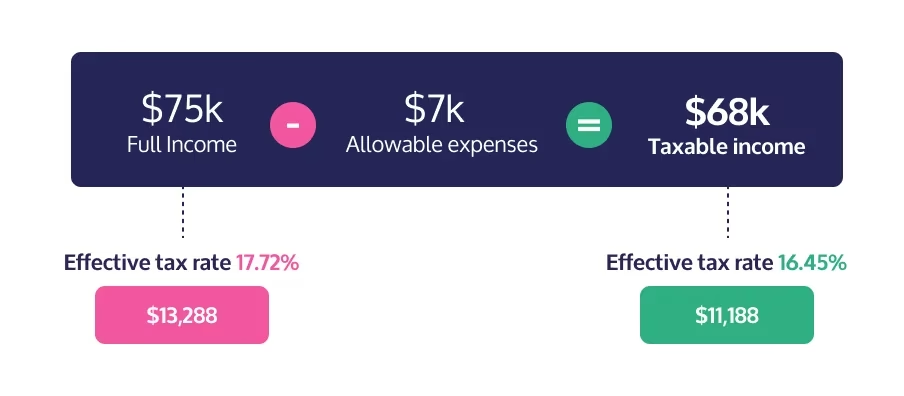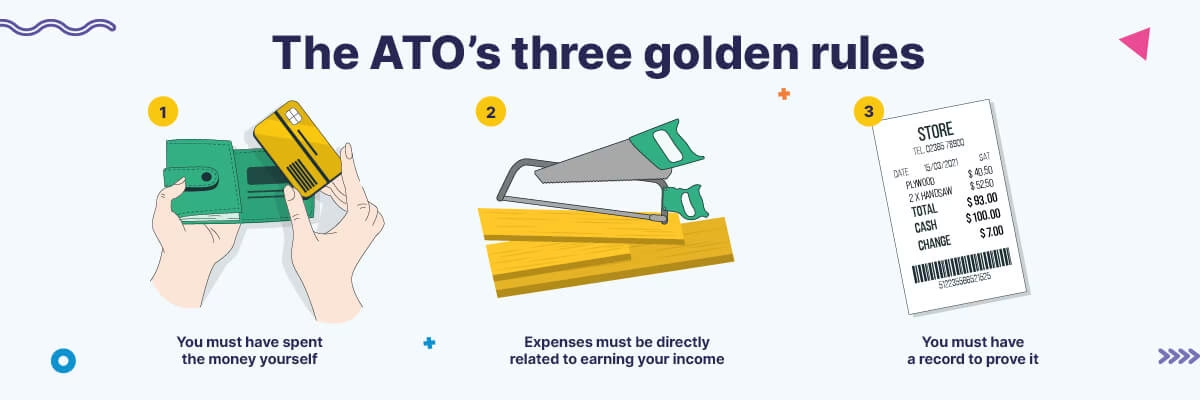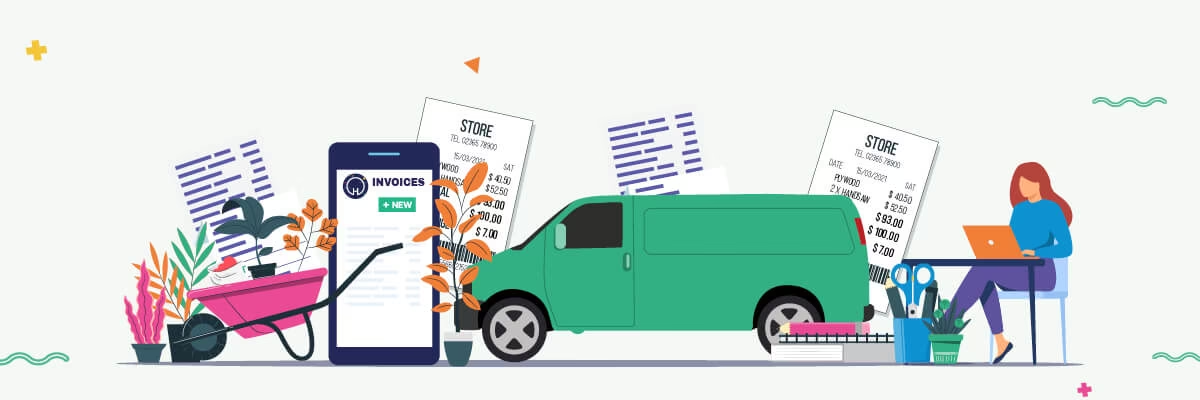It’s pretty common knowledge that you can (legally!) lower your tax bill by claiming tax deductions for business expenses.
But what does that mean, exactly? And how do you get the most bang for your tax buck from your own business expenses?
To help answer these questions and more, we’ve put together this article on how tax deductions work, and what you need to know in order to lower your tax bill.
We’ve also compiled a list of the most common business expenses claimed through Hnry, by industry. So if you’re wondering what your plumber mates claim in their tax returns, look no further!
Ready to make the most of your expense claims?
- What is a tax deduction?
- How to claim a tax deduction
- Top 5 deductions claimed by:
What is a tax deduction?
Contrary to popular belief, a tax deduction isn’t money deducted out of the taxes you pay, that you then get to keep. Instead, tax deductions lower your taxable income. This in turn lowers your effective tax rate.

💡 Your effective tax rate is the average tax rate you pay on your income after applying all the tax rules. For more information, check out our article on income tax rates.
The ATO allows you to claim certain business expenses (or part of an expense) as tax deductions. This means that you won’t pay tax on the amount claimed, NOT that you get this amount back as a tax refund.
Sounds confusing? Let’s break it down:
That’s a tax saving of $2,100 just from this one deduction claimed!
📖 Calculate your own potential tax savings using our Australian sole trader tax calculator!

How to claim a tax deduction
To claim a tax deduction, you’ll need to raise an expense claim for eligible business expenses. But it’s important to note that not every business expense is tax deductible.
In order to stop people taking the mickey, the ATO has pretty strict rules about what people can and can’t claim as a business expense. In order to be eligible, a claim has to meet these three requirements (aka the ATO’s three golden rules):
- You must have spent the money yourself and weren’t reimbursed.
- The expenses must directly relate to earning your income.
- You must have a record to prove it (usually a receipt).
On top of this, valid expenses may vary from industry to industry. For example, you can claim your weed wacker as a business expense if you’re a landscaper, and you use it to do your job. You might not be able to claim a weed wacker if you’re a kids party clown – even if you use it to mow down balloon animals as part of your act.
(Which is a terrible idea for a party clown set, by the way.)
Anyway, now you have the gist of what you can and can’t claim, and how to claim it, let’s look at the –
Top 5 tax deductions claimed by industry
Automotive repair and maintenance (aka mechanics, panel beaters, detailers)
- Materials
- Example: engine oil, brake fluid
- Equipment purchase
- Example: socket set, torque wrench
- Vehicle expenses
- Example: WOF, rego, fuel
- Mobile phone bill
- Example: phone plan fees
- Advertising
- Example: website costs
Builder/House construction workers
- Materials
- Example: timber, nails
- Vehicle expenses
- Example: WOF, rego, fuel
- Equipment purchase
- Example: nail gun, drill
- Subcontractor fees
- Example: subcontractor fees (of course)
- Mobile phone bill
- Example: phone plan fees
Carpenters/Joiners
- Equipment purchases
- Example: drill, saw
- Vehicle expenses
- Example: WOF, rego, fuel
- Materials
- Example: screws, timber
- Subcontractor fees
- Example: subcontractor fees (duh)
- Health and Safety equipment
- Example: safety glasses, dust mask
Concreting services
- Equipment purchase
- Example: trowels, screeds
- Materials
- Example: cement mix, rebar
- Vehicle expenses
- Example: WOF, rego, fuel
- Clothing expenses (occupation specific)
- Example: high-vis vest, PPE
- Parking and transport
- Example: parking fees
Construction workers
- Vehicle expenses
- Example: WOF, rego, fuel
- Equipment purchase
- Example: drill, nail gun
- Materials
- Example: cement mix, timber
- Subcontractor fees
- Example: subcontractor fees
- Mobile phone bill
- Example: phone plan fees
Electricians
- Materials
- Example: electrical wire, fuses
- Equipment purchase
- Example: screwdrivers, drill
- Vehicle expenses
- Example: WOF, rego, fuel
- Subscriptions fees
- Example: EWRB Practising Licence
- Travel
- Example: domestic flights, accommodation (but only in specific circumstances!)

Gardners
- Equipment purchases
- Example: pruning shears, shovel
- Vehicle expenses
- Example: WOF, rego, fuel
- Materials
- Example: fertiliser, plants
- Home office equipment
- Example: printer, pens, paper
- Professional fees
- Example: the 1%+GST Hnry fee!
Landscapers
- Equipment purchase
- Example: rake, wheelbarrow
- Materials
- Example: pavers, stone
- Vehicle expenses
- Example: WOF, rego, fuel
- Health and safety equipment
- Example: gloves, safety glasses
- Professional fees
- Example: the 1% + GST Hnry fee!
Painters/Decorators
- Equipment purchase
- Example: paint brushes, rollers
- Materials
- Example: paint, masking tape
- Vehicle expenses
- Example: WOF, rego, fuel
- Subcontractor fees
- Example: subcontractors fee (obviously)
- Insurance
Repairs and maintenance
- Materials
- Example: timber, nails
- Vehicle Expenses
- Example: WOF, rego, fuel
- Equipment purchase
- Example: sanders, hammer
- Subcontractor fees
- Example: subcontractor fees (you guessed it)
- Clothing expenses (occupation-specific)
- Example: steel-capped boots, PPE
Claim deductions using Hnry
For just 1% + GST of your self-employed income, capped at $1,500 a year, Hnry will calculate and pay all your taxes, levies and whatnot for you, including:
We can also handle things like:
- Managing expenses
- Quotes
- Invoices
- Invoice chasing (politely of course. Get paid 8 days faster than the industry average!)
- Scheduling invoices
and we automatically complete and lodge your tax returns for you. Basically, we become your accountant. And you’ll never have to think about tax again!
Share on:


